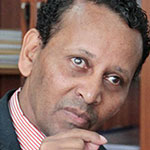
Featured | Sep 06,2020
Apr 20 , 2019
By
Revolutions sound romantic and ideal. They are always depicted as the ideals of the people meeting the courage of determined fighters to realise an endless supply of prosperity and happiness for a previously decrepit nation with a bleak future.
Citizens of neighbouring Sudan have been fighting for such a utopia. The nation, deprived of inclusive political and economic institutions, like most African countries, is the most recent to chuck out its long-time leader, Omar al-Bashir, who has been in power for three decades. He was recently ousted from office by the Sudanese Armed Forces, all thanks to sustained anti-government protests.
Indeed, in a country where inflation had stood at over 70pc, even al-Bashir must have thought the Sudanese needed to express their anger and frustration somehow.
But protests have not stopped, and the Sudanese people have been clear that they want to see a civilian government installed instead of the temporary military council that has been set up. Here as well, the protestors are spot on. African military officials are notoriously infatuated with power - a little taste and they become addicts.
Still, there is something about the promises of the “new” that leaves a sour taste in one’s mouth. Revolutions have such scale and momentum, overwhelming us with how bad the past was, that we forget to ask just what may be in store for the future.
One of the reasons for the success of the protests in Sudan is that there was no authority to stem the anti-government movement. It was a “people’s movement,” where there was a unity of purpose created by antipathy toward the current leadership.
What happened in Sudan is, in fact, a textbook example of revolts, where there is a clear short-term goal - oust the repressive leader or system - but no consensus on what should come next. Of course, authoritarian governments, in their very nature, only make it easy for a straightforward plan of ousting them through sheer physical force by systematically getting rid of any cool heads capable of sitting down and putting together a long term plan.
A revolution as in Sudan’s, where there is no clarity on who should take over, creates a power vacuum that is easily exploited by the various forces within a country. For there is only a unity of purpose on what should be rejected, and none on what should replace it, the tendency is toward partisanship. Everyone will see conspiracies and want the biggest piece of the pie that they can get. The compromise would begin to be seen as a sign of weakness.
What we see in Ethiopia, to a certain extent, is the short-term future of Sudan even under a civilian government. Almost everyone wanted a change, but there was no clear consensus - or patience to arrive there - on what that change should entail. For every group, this has become an individual revolution, at least it seems to be a self-liberation.
But then what? What do we do with ourselves once the battle has been won and the old system or regime has been removed?
Ideally, the battlefield should be cleared and “old men” should start talking. Unfortunately, this does not happen often, and the strongest group of the resistance amasses enough power to become the very villain it initially opposed.
If Sudan’s or Ethiopia’s revolution fails, it would be because the political elite was either scared of their constituencies, greedy or short-sighted to come to a consensus. If this is the case, then it is the oldest cliche in African politics. If not, then there truly is an African Renaissance.
PUBLISHED ON
Apr 20,2019 [ VOL
20 , NO
990]

Featured | Sep 06,2020

Commentaries | Mar 23,2024

Commentaries | Sep 21, 2024

Viewpoints | May 01,2020

Radar | Apr 08,2023

Verbatim | Mar 02,2019

My Opinion | Feb 09,2019

Radar | Feb 18,2023

Radar | Oct 26,2025

My Opinion | Feb 25,2023

Photo Gallery | 178775 Views | May 06,2019

Photo Gallery | 168972 Views | Apr 26,2019

Photo Gallery | 159817 Views | Oct 06,2021

My Opinion | 137111 Views | Aug 14,2021
Commentaries | Oct 25,2025

Dec 22 , 2024 . By TIZITA SHEWAFERAW
Charged with transforming colossal state-owned enterprises into modern and competitiv...

Aug 18 , 2024 . By AKSAH ITALO
Although predictable Yonas Zerihun's job in the ride-hailing service is not immune to...

Jul 28 , 2024 . By TIZITA SHEWAFERAW
Unhabitual, perhaps too many, Samuel Gebreyohannes, 38, used to occasionally enjoy a couple of beers at breakfast. However, he recently swit...

Jul 13 , 2024 . By AKSAH ITALO
Investors who rely on tractors, trucks, and field vehicles for commuting, transporting commodities, and f...

Oct 25 , 2025
The regulatory machinery is on overdrive. In only two years, no fewer than 35 new pro...

Oct 18 , 2025
The political establishment, notably the ruling party and its top brass, has become p...

Oct 11 , 2025
Ladislas Farago, a roving Associated Press (AP) correspondent, arrived in Ethiopia in...

Oct 4 , 2025
Eyob Tekalegn (PhD) had been in the Governor's chair for only weeks when, on Septembe...

Oct 25 , 2025 . By YITBAREK GETACHEW
Officials of the Addis Abeba's Education Bureau have embarked on an ambitious experim...

Oct 26 , 2025 . By YITBAREK GETACHEW
The federal government is making a landmark shift in its investment incentive regime...

Oct 29 , 2025 . By NAHOM AYELE
The National Bank of Ethiopia (NBE) is preparing to issue a directive that will funda...

Oct 26 , 2025 . By SURAFEL MULUGETA
A community of booksellers shadowing the Ethiopian National Theatre has been jolted b...